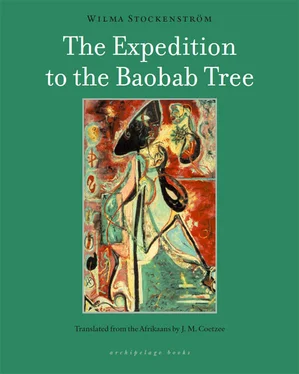I never forgot your lessons, and even now I could laugh lewdly if I had to, and even now I could, like a cat, snuggle up lithely or wriggle free, and temper or increase my intensity as the situation demanded; but that has all become superfluous.
Now I live in a hollow with sleep the dense solution. I live in time measured by myself, initially with three beads, later with more and more till I chose the best of the green ones for my arrangement. So, to begin with, there passed in cycle a green day and two black days, later just a string of green days. Later I grew tired of green days and varied them with black in any conceivable pattern and number, as determined by mood and chance. My days became grouped. It was already a method to counter the vagueness of time hiding behind the course of nature. Time threatened me. It wanted to annihilate me. I thought I cheated it by changing my system every so often. Never did time know what I was going to try next, where even in the morning when light and chirruping awoke me I did not know what I was going to try with time, where I looked for firewood as and when necessary, fetched water when my supply was up, searched for food when I had to, and ate when I felt hungry, slept when drowsiness made my limbs heavy. And I dreamed and nodded through rose quartz.
I was reaching a stage of forgetting my counting toys, which then numbered only three and were gradually beginning to bore me, on the knot on the inner wall of the tree, when one day I picked up in various places more potsherds and beads as well as copper wire, and brought all this back. I added the rest, sherd and bead, to the heap, these leavings of inhabitants whom I wished ill because they could leave no more than this, potsherds that would not fit together and become a whole roundness, pitiful decorations that I irritably strung on stalks and carried around my neck, rusty copper-wire rings, thick and heavy as shackles, with which I could do nothing, and nothing more in my vicinity. Nothing more — or was I roaming over graves? Nothing more — or was I roaming over walls submerged in dust and overgrown with plants? Was I perhaps roaming over courtyards and squares, fortifications, terraces, conduits, halls and shanties, settlements and streets crumbled into insignificance, taken over by the winters and the summers? Was I roaming over the place that we aimlessly came looking for, purposefulness long ago relinquished in the pitiless sun? Place of strips of underbrush and prickly grass, of a river off to one side hidden behind ripine trees and creepers, of hills with flattened crests on which gigantic round rocks piled in fantastic shapes, place of my towering baobab? Tableaus through which we roamed dazed, frightened? Place of predator and prey?
I imagine bloody wars of extermination. Droughts. An epidemic. I think of unflagging zeal, followed by collapse and despair. And then nothing, just a tiny residue that does not help me however much I make believe I have found a way of warding off the danger of timelessness through order. Because I resisted becoming a mere yawn in the lazy passage of the days, a mere transitory draught of air, a subordinate beat in the rhythm, a phantom within a rupture in eternity.
Too scantily endowed to fashion something myself, I used the artefacts of forgotten people to while away time, to coagulate time, with the bitter realization that it was changing nothing in the nothingness. But it made me feel good to handle the things and to wonder and to give my imagination rein, supplemented by memories of a different kind of earlier time.
For it was endowed with nothing but memories that I landed here, a famished, tattered being, struggling through plains and valleys, fevered with privation, stumbling on towards a steadily receding horizon, always day stages away, always the same, to be swallowed in by a tree, merciful harborage, merciful cool shelter that reminds one roughly of a building with walls and spout-shaped rising ceiling and earth for a floor, a giant hut crowned with branches and leaves.
Curse the will-o’-the-wisp that led me here, that traveler through my life and the lives of others on whose lips I hung and whom I slavishly obeyed, blind with obsession, disordered, out of my senses. Curse him who made a spectacle of our sacrifice and wanted to give the attractiveness of understanding to hardship, the attractive useless self-knowledge that killed him, oh the talk, the talk, the omniscience, the all-investigating consciousness that could explain nothing, least of all the betrayal of comrade and following. Oh, the powerlessness of reasonableness!
Stranger in msasa-red clothes, from the beginning his wit charmed me. He knew the quips that light up an all too gloomy conversation. He knew more points of the compass than the disputatious poets and other such celebrities who congregated in the home of my owner, the rich widowed merchant, to eat my well-prepared meals and to pay for them and for the intercourse with his pretty slave girls with sophisticated conversation, even if this was limited to looking and desiring, or at most to some daredevil trying to fondle them when he thought his host was looking the other way. This one, on the other hand, in his msasa-red, in his water-green, in his flame-yellow, this one with his gold-speckled necklaces and slim gold bracelets was in no small measure well-read and self-confidently informed about affairs. Without being asked he delivered a rejoinder, briefly summed up long-windedness, and time and again carried the arguments to ridiculous ends. Which made him little loved among our great spirits, who without success egged him on and tried to catch him in sacrilege or sedition. Let the gods stare over our heads. They know what they see. He asserted. Let the ancestors alone. Their intercession is not needed when you live unimpeachably.
Isn’t that so? he asked. Isn’t that so?
As fresh and new as lightning he put it to me.
So too the intercession of the prophets and the intercession of the family members of the prophets and the intercession of the gods combined and the intercession of god-fearing people, as well as the moral lessons to be learned from the experiences of people who elevate their tribal history to a religion — all this is interesting, and long may it be so. And invoking a deity morning and evening is beautiful music, is a resonant component of the sounds with which a man attests that he not only thinks of food and propagation but considers himself immortal as well and therefore wants to take appropriate measures to ensure himself a pleasant afterlife. Let them. Let them by all means.
And let the merchants carry on. They are providing all this prosperity — and with an eloquent gesture he handed a porcelain dish of shrimps stewed with rice in sesame oil and coconut milk to the peevish poet on his right, while smiling in my direction. I thought he winked at me.
My owner’s sardonic gaze rested on me. He beckoned me closer and his copper bracelets fell from his wrist to his elbow, so thin had his arm become. I picked up the palm fan to fan him. His upper lip was damp with droplets of sweat. Tonight he would again shiver with fever. He was already a sick man, probably dying, when I moved in with him and dared to become his youngest favorite. With long regular movements I tried to stir the heavy air around his face. He had left his food untouched, just tasted a dish of water. Poor creature inexorably gasping out a rich man’s life with the spectacle of so much abundance before him. Influence and power slipped out of mouth and nostrils. Stored-up memories played themselves out in his cloudy eyes when the eyelids, between the spells when he sat and dozed, opened a slit and he presumably observed his guests, his slave girl servants, his sons and daughters gathered in luxury and pride. And his emaciated fingers, what were they trying to catch? A butterfly? The salt breeze? A woman’s laugh?
Читать дальше












